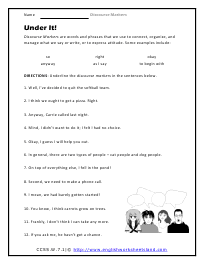Discourse Marker Worksheets To Print:
Under It! – Underline the markers in the sentences.
Show Me Some Attitude! – Choose three of the discourse markers above and use it to write an original sentence.
Getting Organized with Discourse Markers – Read each sentence. Underline the discourse marker. Then, on the line, indicate how it is functioning in the sentence by writing A, B or C on the line.
Spoken or Written? – Study each discourse marker below. Decide if it is more likely to be spoken or written. Write spoken or written on the line.
What's the Point? – Choose the function of each discourse marker in the sentences below.
Saying Something in Another Way – Use a discourse marker to write a second sentence that pairs with each sentence.
Responding with Discourse Markers – Fill in the blanks in the scripts below with appropriate response tokens. Use the information in parentheses as clues.
Original Sentences – Write an original sentence with each discourse marker. Briefly describe the function the discourse marker is serving in your sentence.
Multiples of Choice – Complete each sentence using an appropriate discourse marker.
Imagine That? – Complete each sentence using an appropriate discourse marker.
Be Choosy – Choose from the words in the box to complete each sentence.
Word Warriors – Discourse Markers are words and phrases that we use to connect, organize, and manage what we say or write.
Written Sentences – Write a sentence with each discourse marker.
Interjections – Replace each wrong interjection with a discourse marker that makes sense. Write your new interjection on the line.
Kitty Markers – Complete each sentence with an appropriate discourse marker.
Get FREE English Worksheets In Your Email

